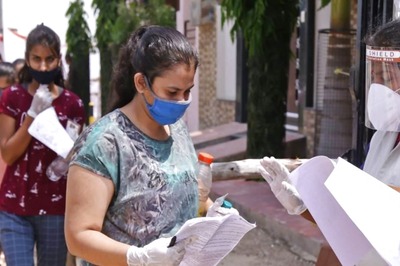
views
London: New vaccine strategies could wipe out lingering reservoirs of polio in northern India and lead to global eradication of the crippling disease by the end of the decade, scientists said on Thursday.
The infectious illness has been eliminated in developed nations but persists in Uttar Pradesh and Bihar in India and in parts of Nigeria, Afghanistan and Pakistan.
Now experts have identified a simple change in the way people are vaccinated that could help wipe it out.
"We won't go into the next decade with polio," director of the Global Polio Eradication Initiative at the World Health Organisation (WHO), Dr Bruce Aylward said
Aylward, Dr Nicholas Grassly and Dr Christophe Fraser of Imperial College London told reporters that switching to a monovalent vaccine against the dominant strain in India from the standard trivalent vaccine that protects against three types of poliovirus is the key.
In a study published in the journal Science they said the virus has been so persistent, despite good immunisation coverage in northern India, because of overcrowded living conditions and poor sanitation.
Those conditions in Uttar Pradesh and Bihar made the oral poliovirus vaccine less effective than in other parts of India and immunised children were still being infected.
The three strains in the trivalent vaccine can interfere with each other inside the body, producing immunity to one strain but not another.
"We were able to confirm there is a relatively easy fix by means of a monovalent vaccine," said Fraser.
Aylward believes the new vaccine strategy, along with improved vaccination coverage, political will and surveillance, will help eliminate the remaining reservoirs in the four nations and achieve the goal of the Global Polio Eradication Initiative that was launched by the WHO in 1988.
Polio, which is incurable, leads to irreversible paralysis. Death occurs in about 5-10 percent of paralyzed patients when their breathing muscles are immobilized.
Since the WHO eradication drive, cases have dropped from 350,000 in more than 125 endemic countries in 1951 to about 1,500 cases so far this year -- the lowest number ever.
But as long as reservoirs of the virus exist, there is a danger of transmission to other countries.
Twenty-five previously polio-free countries were reinfected between 2003-2005, according to the WHO.
"This study has been extremely helpful in showing this disease can be eradicated," Aylward said.
He added that there would be a major effort in the first part of 2007, despite a $100 million funding gap, to knock out the type 1 strain of the virus, which is the most prevalent worldwide, and then a mopping up of the type 3 strains.


















Comments
0 comment